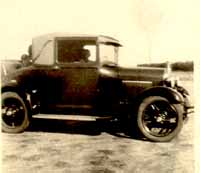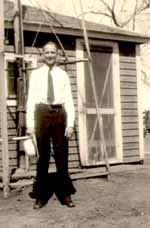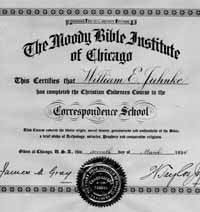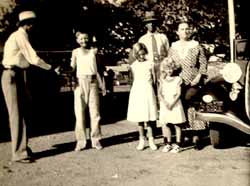| Meta Goering was in the eighth grade in Pioneer school (1928-29) the
first time she became aware that Willie Juhnke was something special.
One of her friends had attended a party, maybe it was at the "Dicke"
("Fat") Pete Stucky place, and reported that Willie had entertained
the crowd with crazy stories. Meta thought Willie would be an interesting
person to meet. The next year (1929-30) Meta was a freshman student
at Moundridge High School where Willie was a senior. They did not have
their first date until Meta was a junior. By then Willie had completed
two years at McPherson College and was teaching at King City grade school,
where he had attended as a child.
Both Willie and Meta were baptized at age fifteen in the Eden Mennonite
Church--June 12 1927 and June 14, 1931. Willie's parents were members
at Hoffnungsfeld, but troubles in that congregation led them to take
their family to worship with the Eden congregation for about ten years
(ca. 1924-33). Their children, however, joined the Eden congregation:
Anna and Emma (1925), Willie (1927), Alvina (1929), and Elsie (1931).
Anna died October 21, 1929, and was buried in the Eden cemetery. When
their troubles with Hoffnungsfeld were resolved, Ernest and Alvina
Juhnke returned to that congregation and took their younger children
along. But Willie remained a member at Eden.
Willie's baptism class included twenty-two members. They had all
grown up in the church and were about the same age. The catechism
class--in the German language--was held every two years. The instruction
was traditional, mostly memorization of questions and answers from
the old "Elbing catechism" first published in Prussia in
1778. To be baptized at Eden was not a testimony to crisis conversion,
but rather marked an event of Christian growth and church membership.
Elder C. J. Goering (Meta's great uncle) baptized them by pouring
a small amount of water on their heads as they knelt, after asking
them a number of questions (in German) about their confession of sin
and belief in salvation through Christ. It was a moment of commitment
which Willie took seriously. Meta was baptized four years later, June
14, 1931, in the same way with a class of twenty-four candidates.
That class included Willie's sister, Elsie.
Both Willie and Meta had good high school experiences at Moundridge.
Bill got mostly B's and C's in high school. His favorite courses were
history, geometry, Latin and civics. Meta excelled academically in
all classes, including Latin and Bible. She participated in debate,
dramatics and choir ("glee club"). Her transcript of yearly
grades, a total of twenty-four grades, had straight A's, except for
a B and B+ in physical education, one B in glee club, and an A- in
typewriting. She was valedictorian of her senior class--and had a
date with Willie for the graduation exercises.
Moundridge was a thriving town of about 750 people in the 1920s when
Willie and Meta attended high school there. In 1927 the school built
four additional classrooms and a gymnasium-auditorium. The high school
principal was I. T. Dirks, a Mennonite who had been a conscientious
objector in World War I. For the Goering and Juhnke families, transportation
to high school was something of a challenge. From farm to school for
the Juhnkes was ten and a half miles and for the Goerings five and
a half miles. (They drove along section lines. Highway #81 along the
Missouri-Pacific tracks between Moundridge and McPherson had not yet
been constructed.) For two years, Willie boarded during the week with
his uncle and aunt, Chris S. and Mary Kaufman Goering, who lived just
west of Moundridge. Aunt Mary was a sister to Willie's mother Alvina.
Willie appreciated the extended family hospitality, but found Uncle
Chris somewhat austere. At mealtime there was a honeypot in front
of Uncle Chris's plate, and no one else ever seemed to dare to ask
for honey.
In November of 1926, during Willie's freshman year and while he
was staying at the Chris Goering home, Willie's sister Emma sent him
a short letter--one of the few scraps of primary historical documentation
surviving from those years. Emma, age twenty-one, had married Joe
Stucky five months earlier and was visiting her parents and helping
with child care while the men gathered fuel "in the woods" for the
winter. Their younger brother, John, was three and a half years old.
Emma wrote, "Yesterday he talked English nearly all day." That was
evidence that the younger siblings were learning English much earlier
than Emma, Anna and Willie had. Emma also wrote that John had learned
a little poem--an apparently proud achievement in 1926 but also evidence
of grass roots racism that is embarrassing for later generations:
Teacher, teacher, don't whip me. Whip that nigger behind the tree.
He stole money and I stole honey. Teacher, teacher, isn't that funny?
Emma ended her letter with an admonition for Willie. "Better be a
good student. . . . Have a good time at the Lyceum course."
|



